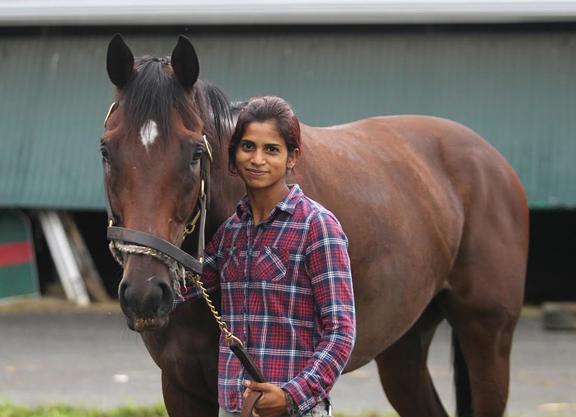A young Indian girl is infatuated by a sport but partaking in it runs counter to everything that her parents and their culture believe, that a woman should focus on her education, family and marriage and that sports are a male domain. Aparna Battula saw that movie, too. “Bend It Like Beckham” was a hit both in the U.S. and India, and she knows what it must have been like to be the main character, Jess Bhamra.
She's lived the same story, only the sport is different. By way of Bangalore, India, Battula came to the U.S. to pursue her dream of becoming not a soccer player but a jockey. She knew that could not be done in her country because women are not accepted on the racetrack there.
“A lot of people compare me to the character in that movie, that my story is just like 'Bend it Like Beckham.' It's the same back home,” Battula said. “The movie is about the Indian culture. Our stories are close. I have a family that does all the same things with me, they say 'you have to have a family, you have to get married, you have to do this.'”
But Battula had her own ideas. So, with her father's reluctant blessing, she moved to the U.S. and enrolled in the North American Racing Academy, then run by Chris McCarron. She won her first race in 2011 at Gulfstream. But she was injured several times and, eventually, a back problem meant she couldn't ride anymore. So Battula switched to training. Today, the 28-year-old has a small New Jersey-based stable, loves what she's doing and loves that she has found a place where a woman has a chance to succeed on the racetrack.
Her original sport was speed skating and she was good enough to compete on an international level. At age 13, she suffered a serious knee injury that derailed her future in that sport. That meant she would likely follow a more traditional path for a female teenager in India: education, marriage, family.
“While I was in sports and pursing that, my dad [Das Battula] was a little lenient with my academics,” she said. “But when I got hurt he said I had to get serious about them. He told me I was getting into the medical field and that I needed to start focusing on getting into a good college in order to get into medical school.”
To that point in her life Battula had never so much as touched a horse. Her father, knowing she liked sports and might benefit from a diversion before beginning her college studies, talked her into taking riding lessons after seeing an ad for them in the newspaper. What neither of the Battulas realized was that the lessons took place at the Bangalore Turf Club and were not for aspiring equestrians but for those who wanted to become exercise riders or jockeys.
“The first time I went to the racetrack, while I was waiting to talk to the coach, I saw two horses breeze by and I thought, 'wow, I want to do this,'” she said.
The instructor, obviously skeptical that a young woman could make it as a jockey or exercise rider, purposely put her on the most ill-mannered horse he had and gave Battula no instructions. He wanted her to quit and go home. She was dumped and run off with several times and left at the end of the day beaten down and body sore. She didn't want to go back the next day, but her father insisted that she did. No matter what she might be doing, he didn't want her to be a quitter. The instructor was so impressed that she had the fortitude to show up that he put her on even-tempered horses and began to teach her to ride.
“He said, 'I never thought I'd see you again,'” she recalls.
She worked the entire summer at the Bangalore racetrack and had improved to the point where she was allowed to jog race horses. The summer ended, and her parents expected her to enroll in college.
“I told them I want to drop out of college because I want to purse a career with the horses,” she said. “That really upset them and my dad said he regretted sending me for the riding lessons. We came to a compromise. He said he would let me pursue a career in racing, but I had to get a college degree first. So I went to a college called Mt. Carmel because it was close to the race course. I worked with the horses in the mornings and then went to my classes. I got a degree in biotechnology.”
Having fulfilled her promise to her father, it was time to begin her career as a jockey. But she knew that would be virtually impossible in India. She recalls only three females ever riding in India and two of them were foreigners. None of them, she says, were ever given much of a chance by trainers or won more than a handful of races.
She researched riding schools in other countries and learned about the North American Racing Academy, where the curriculum include time in the classroom studying traditional college subjects. She was soon on a plane to Lexington.
“I showed my dad the information about the school and that they had real courses there and he didn't think twice,” she said. “He was now convinced that I would have an actual opportunity to succeed.
“My dad has always been the one who pushed me. He's the one who motivates you and he was the only person who supported me to come here. When I first asked him if I could be a jockey he was reluctant because he knew that in India it would not have been a wise move. All his family was against it; they all said you can't send a girl out to do that.”
She would ride for three years and win 27 races. Her problem was momentum as her career was plagued by stops and starts due to several injuries. To this day, she cannot even gallop horses due to lingering back problems. She also missed time when returning to India for an extended period to be with her mother after her father died.
She did not ride at all in 2014 and would wind up at the Fair Hill training center in hopes that she could get fit and ready to go again by galloping horses. She met some owners who had a horse named Kirkies Dream (Act of Duty) who was showing nothing on the racetrack. They asked Battula to see if she could wake up the horse and she accepted the assignment. Her training career had begun.
Making his first start for Battula, Kirkies Dream finished third in a $15,000 maiden claimer at Indiana Downs in 2015, missing by just a head.
But just as was the case with her riding career, her time as a trainer has been marked by problems, most of them of the red-tape variety. Because she is not a U.S. citizen, she was always having to worry about getting a green card or an extension of her working visa. She says she has turned down horses because she could not promise potential clients that she would be able to stay in the U.S.
Despite the headaches she was facing, she found out that she enjoyed training.
“I just realized I needed mental stimulation, something to keep me busy,” she said. “I enjoy training because you are making decisions constantly.”
She has just two horses in her stable and has won just one race so far, but it was an important one. She claimed Mo Mon's Copycat (Mo Mon) for $5,000 and five starts later the mare won a $50,000 allowance for New Jersey-breds at Monmouth at odds of 36-1.
She is still working with her lawyer in order to get a green card and, eventually, citizenship status. She believes once she works her way through the immigration bureaucracy it will be easier to attract owners and build her stable.
She came a long way (8,000 miles) to get here, was repeatedly thrown off the first horse she ever sat on and wouldn't listen to the doubters back home who insisted the racetrack was no place for a young Indian woman. She may have some obstacles in front of her, but a lack of determination is not one of them.
Not a subscriber? Click here to sign up for the daily PDF or alerts.






